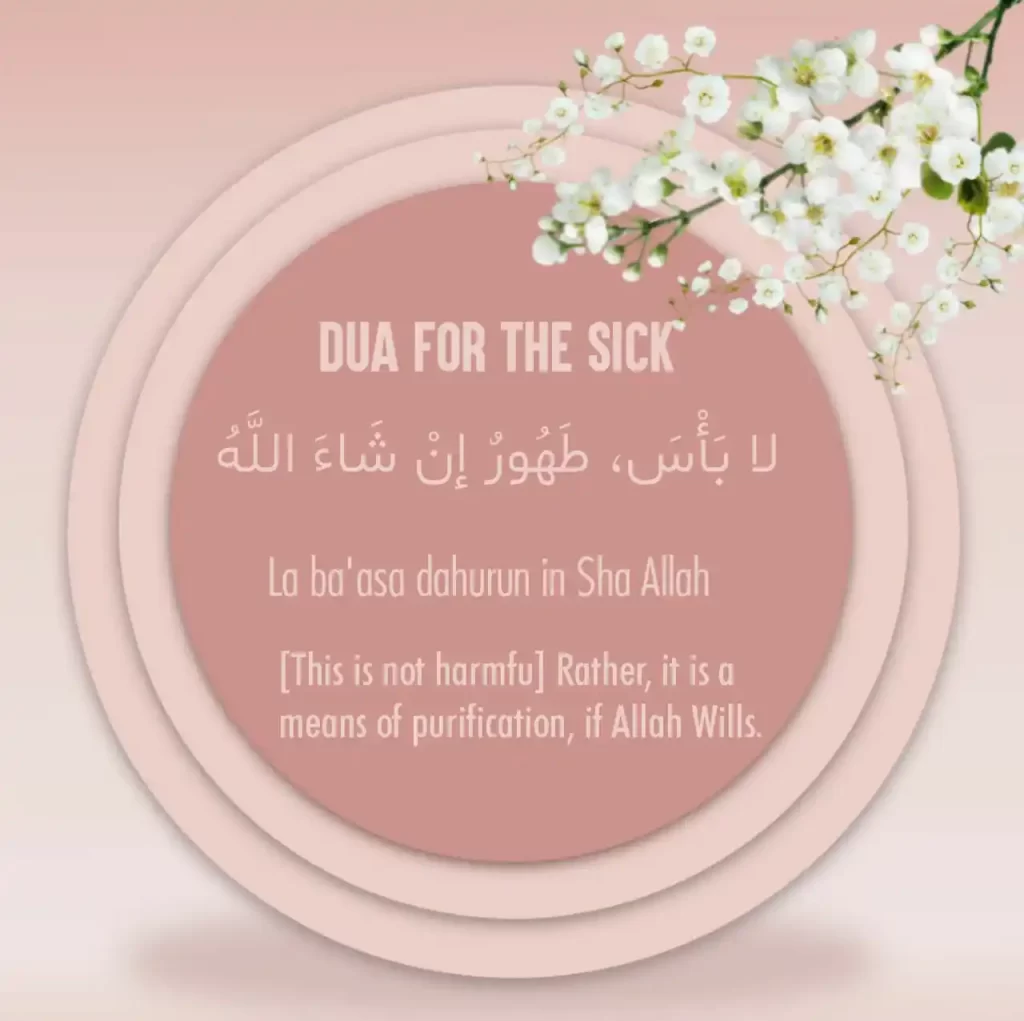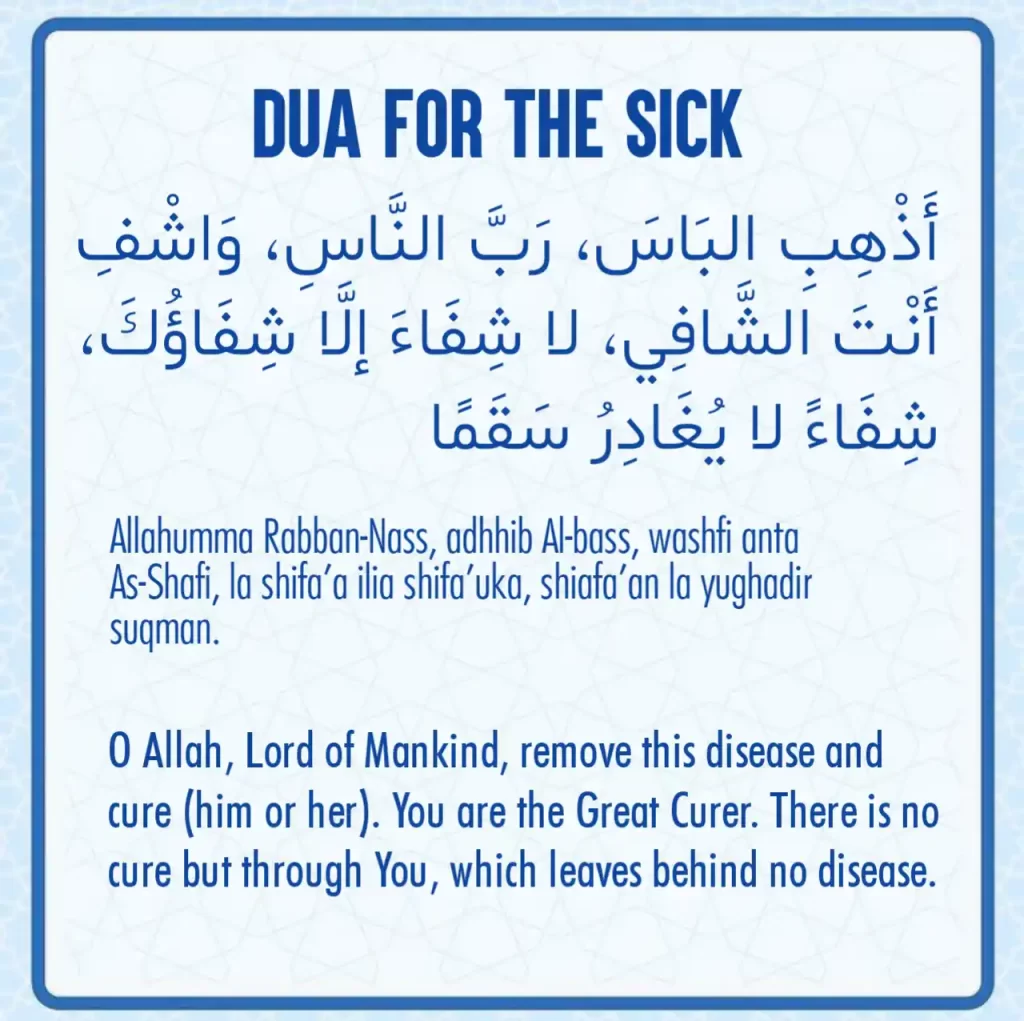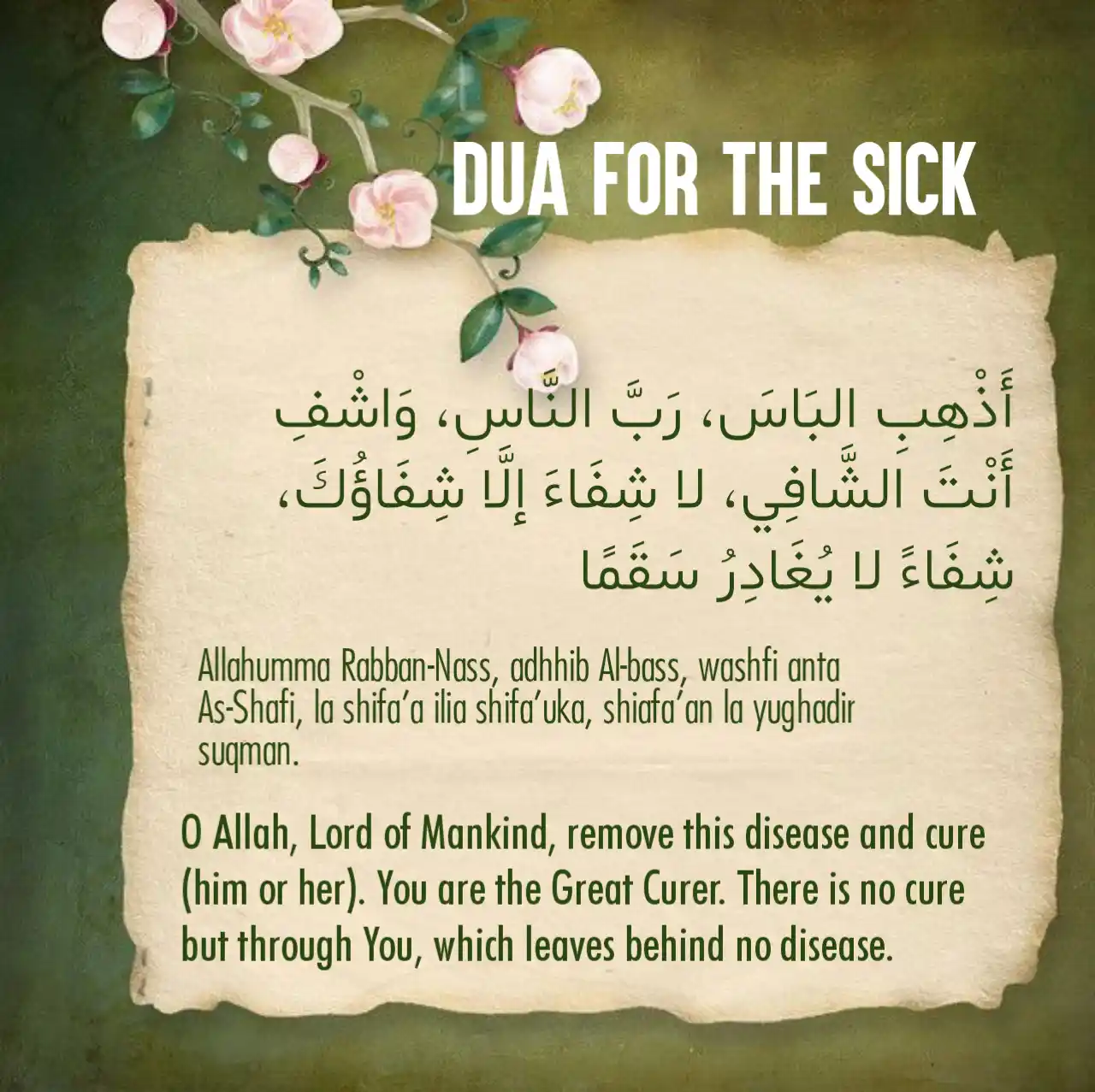4 Dua For The Sick In English, Transliteration, And Arabic Text
In this piece, we will be looking at some beautiful dua for the sick or supplications to be said to the sick person according to Sunnah.
Advertisements
Indeed, Islam has come with the encouragement of paying attention to the tights of the sick, as well as the regular visiting of the sick, supplicating that he be cured and granted well-being, along with clarification of the types of supplications that are best to be recited at the time of visiting the sick.
Likewise, it is incumbent upon the visitor to select the supplication which is most comprehensive, and to eagerly seek out those supplications which have been transmitted from the Prophet, since these are blessed supplications which encompass all good, and which are free from mistakes or errors.
Dua For The Sick in Arabic
The Dua For Sick in Arabic is written as:
لا بَأْسَ، طَهُورٌ إنْ شَاءَ اللَّهُ
Advertisements
Transliteration
The dua is transliterated as La ba’asa dahurun in Sha Allah
Meaning In English
[This is not harmfu] Rather, it is a means of purification, if Allah Wills.

Or he might say:
0 Allah! Cure So-and-So.
Or he might recite seven times:
Advertisements
أَسْأَلُ اللَّهَ الْعَظِيمَ رَبَّ الْعَرْشِ الْعَظِيمِ أَنْ يَشْفِيَكَ
Transliteration
As’alullaahal Adheema Rabbal Arshil Adheemi ‘an yashfiyaka.
Meaning
I ask Allah, the Supreme, Lord of the Magnificent Throne, to make you well.
Advertisements

- Read also: Powerful Dua For Visiting The Sick
- Dua For Visiting The Grave
- Dua For Sick Child (Child Health)
2. Dua For Sick In Arabic
The dua for the sick in Arabic Text is,
أَذْهِبِ البَاسَ، رَبَّ النَّاسِ، وَاشْفِ أَنْتَ الشَّافِي، لا شِفَاءَ إلَّا شِفَاؤُكَ، شِفَاءً لا يُغَادِرُ سَقَمًا
Transliteration
Allahumma Rabban-Nass, adhhib Al-bass, washfi anta As-Shafi, la shifa’a ilia shifa’uka, shiafa’an la yughadir suqman.
Meaning In English
Whenever the Prophet SAW visited any ailing member of his household, he would say:
O Allah, Lord of Mankind, remove this disease and cure (him or her). You are the Great Curer. There is no cure but through You, which leaves behind no disease.

He would touch the sick person with his right hand while reciting this supplication on him.‘O Allah, Lord of Mankind,’ he entreats Allah, Honored and Glorious with His All-encompassing Lordship.
He is the Lord, The Mighty and Sublime, the Creator, the King, the One Who directs all affairs.
So, you (the sick) say: Allah Honored and Glorious, created me hale and hearty, then He decreed that I fall sick.
The One Who decreed illness upon me after I had been hale and hearty is (surely) able to heal me.
This is because He is the Lord of mankind and He does what He wills, Honored and Glorious is He.
Remove this disease, that is, the illness that has befallen this person. And cure him which means a removal of illness and recovery of the sick person.
So, he said: ‘ishfi’ and not ‘ashfi’ because the latter means ‘ahlik – destroy (him)’ while the former means to recover from illness. is why it is commonly said: ‘Allahumma ishfi fulanan wa la tashfihi – O Allah, heal so and so and do not destroy him.
Ishfihi means free him from ailment while ‘ashfihi’ means destroy him.As-Shaafi, The Great Curer is Allah, Honored and Glorious, because He is the One Who heals the sick.
Any prepared medication or recited invocation is only but a means, which may be beneficial or not.
Allah, Honored and Glorious, is the One Who makes the means effective.
Therefore, two persons may be struck by the same ailment and undergo same treatment, but one dies and the other recovers.
This is because all matters are in the Hands of Allah, Honored and Glorious and He.
He is the Great Curer, and whatever is prepared of medicine or recited of incantation is only but a means.
And we are commanded to use these means as the Prophet said: ‘Seek cure but do not seek cure in what is unlawful.
He also said: ‘Allah has not sent down a disease without sending down its cure.
There is no cure but through You. The Messenger of Allah SAW has spoken the truth; there is no cure except through Allah.
The cure of creatures is only but a means, the Curer is Allah.
It is not the doctor nor is it the medicine which cures, the doctor and the medicine are both means, the Curer is Allah.‘
(Bewtow) a cure which leaves behind no illness,’ that is, a perfect healing which would not leave any form of ailment.
3. Dua
A person visiting the sick should touch his body with his right hand and utter this supplication.
Abu Said Al-Khudri reported: Jibril (Gabriel) came to the Prophet M and said: “O Muhammad! Do you feel sick?” He said, “Yes.” Jibril supplicated thus (i.e., he performed Ruqyah ):
بِسْمِ الله أرْقِيكَ، مِنْ كُلِّ شَيْءٍ يُؤْذِيكَ، مِنْ شَرِّ كُلِّ نَفْسٍ أَوْ عَيْنِ حَاسِد، اللهُ يَشْفِيك، بِسْمِ الله أرْقِيكَ
Transliteration
Bismillahi arqika, min kulli shay’in yudhika, min sharri kulli nafsin aw ayni hasidi, Allahu yashfika, bismillahi arqika .
Meaning In English
With the Name of Allah. I recite over you (to cleanse you) from all that troubles you, and from every harmful mischief and from the evil of the eyes of an envier. Allah will cure you; and with the Name of Allah, I recite over you].

When one utilizes supplications found in the Sunnah, then this is praiseworthy, and doing this is the best.
However, if a person does not know this supplication, he may supplicate with whatever is appropriate (such as):
May Allah heal you, May Allah grant you health, I beseech Allah to grant you healing, I ask Allah to grant you health,’ and similar statements.
Allah alone grants success.
All of this care and attention, commitment and supplicating springs from the fact that the condition of the true believers is as though they are one soul [e. as though they are all members of one body, sharing hopes and pains].
Hence, that which brings joy to one of them, brings joy to them all. And what causes pain to one of them, causes pain to them all.
According to Hadith, the right of a Muslim upon a Muslim are six:
- When you meet him, greet him [saying: As-Salamu alaikum];
- When he makes an invitation to you, accept it;
- When he asks you for sincere advice, give him sincere advice;
- When he sneezes and then praises Allah, supplicate for him that Allah have mercy upon him; and
- When he falls ill, visit him; and
- When he dies, follow his funeral procession.
Many textual evidences have come to us clarifying the virtue and excellence of visiting the sick, as well as the magnificence of its reward with Allah.
It is commendable for a Muslim when visiting a sick person to put him at ease, make him feel like his situation is not so bad, remind him of the reward of Allah and that the sickness is a means of expiation of sins for him as well as a purification.
Whenever the Prophet SAW entered upon a sick person to visit him, he would say:
[This sickness is] not harmful Rather, it is a means of purification, if Allah Wills.
It is from the Sunnah, that the visitor sit at the head of the sick person.
It is recorded in al-Adabul mufrad by al-Bukhari, on the authority of Ibn Abbas, that he said:
Whenever the Messenger of Allah SAW would visit a sick person, he would sit at his head. Then, he would say seven times:
I ask Allah, the Supreme, Lord of the Magnificent ‘Throne, to make you well. (To be recited seven times)
So, if his appointed term (of life) is going to be delayed, he will be cured from his sickness.
From the Sunnah is that the visitor places his hand upon the body of the patient at the time when he intends to supplicate for him.
It is recorded that when the Prophet SAW visited Sa’d ibn Abi Waqqas, he placed his hand on his forehead, then wiped his hand over his face and his stomach. Then, the Prophet SAW said:
0 Allah! Cure Sa’d.
In placing the hand upon the sick person is a means of putting him at ease, a means of coming to know the severity of his sickness or mildness of it, and gendeness towards him.
Additionally, it is incumbent upon the visitor to advise the sick person that he supplicate (for himself), and that he (i.e. the visitor) not say in the presence of the sick person anything except that which is good.
Advertisements








4 Comments